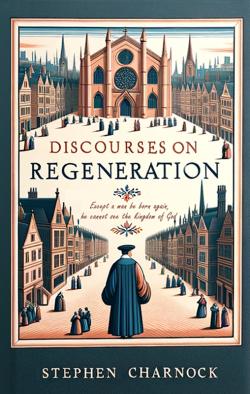"Discourses on Regeneration" by Stephen Charnock is a theological work focusing on the Christian doctrine of the new birth. Charnock explores the necessity of spiritual rebirth and transformation, emphasizing the Christian concept that true, meaningful change in one's spiritual life emanates from a divinely inspired internal renewal. The book is structured as a series of discourses exploring various aspects of this regeneration, such as its nature, efficient cause, and the role of the Word of God as its instrument. This work is particularly valuable for theology students seeking to deepen their understanding of Christian doctrine and its application to spiritual life.
Man, in all his capacities, is too weak to produce the work of regeneration in himself. This is not the birth of a darkened wisdom and an enslaved will. We affect a kind of divinity, and would centre ourselves in our own strength; therefore it is good to be sensible of our own impotency, that God may have the glory of his own grace, and we the comfort of it in a higher principle and higher power than our own. It is not the bare proposal of grace, and the leaving the will to an indifferent posture, balanced between good and evil, undetermined to the one or the other, to incline and determine itself which way seems best to it. Not one will, in the whole rank of believers, left to themselves. The evangelist excepts not one man among them; for as many as received Christ, as many as believed, were the sons of God, who were born; which believers, every one that had this faith as the means, and this sonship as the privilege, were born not of the will of the flesh nor the will of man.
God challenges this work as his own, excluding the creature from any share as a cause: Ezek. xxxvi. 25-27, 'I will sprinkle clean water upon you, I will cleanse you, I will give you a new heart, I will put a new spirit into you, I will take away the heart of stone, 1 will give you a heart of flesh, I will put my Spirit into you.' Here I will no less than seven times. Nothing is allowed to man in the production of this work in the least; all that is done by him is the walking in God's statutes by virtue of this principle. The sanctifying principle, the actual sanctification, the reception of it by the creature, the removal of all the obstructions of it, the principle maintaining it, are not in the least here attributed to the will of man. God appropriates all to himself. He does not say he would be man's assistant, as many men do, who tell us only of the assistance of the gospel, as if God in the gospel expected the first motions of the will of man to give him a rise for the acting of his grace. You see here he gives not an inch to the creature. To ascribe the first work, in any part, to the will of man, is to deprive God of half his due, to make him but a partner with his creature.
Some key insights from the book:
Charnock discusses how a heart renewed by God naturally conforms to His laws, much like a key fitting perfectly into a lock. This conformity is so intrinsic that even without external law, a renewed soul would naturally follow the ways of holiness. He emphasizes that divine law is not primarily for the righteous but for those yet to be renewed, illustrating the transformative power of spiritual rebirth.
Charnock highlights the profound importance of Christ's love, as manifested in the Gospel, and its role in spiritual regeneration. He notes that the entire testament is underpinned by Christ's sacrifice and that the ongoing work of the Holy Spirit, the preaching of the word, and the celebration of sacraments all serve the purpose of fostering spiritual life and growth.
He also points out the limitations of human will in the process of regeneration. He compares the process of spiritual rebirth to the impossibility of a person causing their own physical birth. He notes that just as original sin was transmitted to humanity without our consent through Adam, so is regeneration conveyed to us through Christ, independent of our will. This insight reflects the belief that spiritual rebirth is a divine act, beyond the capacity of human effort or will
To the Reader
The Necessity of Regeneration
A Discourse on the Nature of Regeneration
A Discourse on the Efficient Cause of Regeneration
A Discourse on the Word, the Instrument of Regeneration
